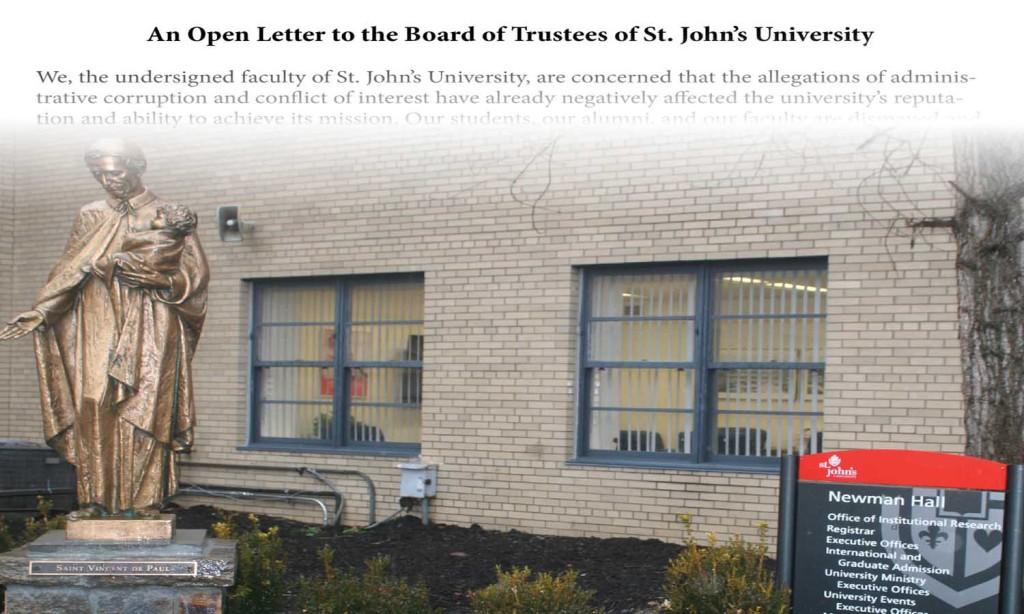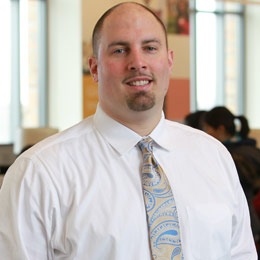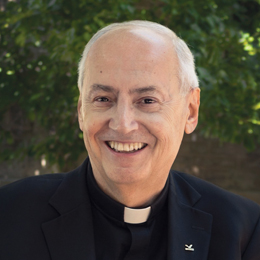UPDATED AND SEEN IN PRINT EDITION, APRIL 10, 2013.
Five St. John’s faculty members have drafted a letter to the Board of Trustees calling for more transparency pertaining to the fallout from allegations of financial impropriety at the highest levels of the University.
The letter, which was obtained by the Torch, requests a public release of the “recently appointed investigator’s report,” a detailed forensic audit and a “broad-based oversight committee of faculty, alumni and student representatives” to review these materials and make recommendations to the board.
Faculty members told the Torch they are currently in the process of circulating the letter and gathering the signatures of colleagues. They said they intend to forward it to the Board of Trustees this month in hopes of sparking the Board into pulling back the curtain on their investigation.
The faculty members’ letter comes in the wake of the University announcing three weeks ago that the Board had hired attorney Frank Wohl “to review certain issues and provide advice going forward.” That move came in light of published reports by New York magazine detailing questionable expense reports filed by Rev. Donald J. Harrington’s chief of staff Robert Wile as well as a business relationship between Harrington and Wile that was never reported to the board.
“We don’t have any idea really what’s going on,” said Dr. Dolores Augustine, one of the five history professors to start circulating the letter. “We know that something is going on, some kind of investigation, but we don’t know what. We know a lawyer has been hired, but we don’t know for whom. For all we know, the lawyer is there to defend Fr. Harrington.”
Harrington, meanwhile, has remained silent during Wohl’s review, canceling several scheduled appearances on campus where students and faculty members would have been able to ask him about the allegations.
In response to a request for comment, a University spokeswoman directed the Torch to the email students received by Board of Trustees chairman Peter D’Angelo.
Augustine said the letter wasn’t drafted because of one particular incident; instead it was sparked by the absence of public involvement from administrators.
“It was the lack of action that moved us to action,” she said. “We’re afraid silence is, in fact, what could really harm the University.”
Augustine later said that 56 signatures had been acquired out of 457 tenured faculty members. She noted that the overall count of faculty covered all University campuses, while all signers came from the Queens campus.
“A lot of people have taken time and have thought about it,” she said, “and it’s coming slowly and steadily.”
Augustine added that those who drafted the letter concentrated their efforts on St. John’s College, though they’ve gotten signatures from the Pharmacy program and College of Professional Studies as well.
One of the biggest concerns of the faculty members who drafted the petition is the public’s perception of the University in light of the allegations. Augustine worries that the negative reputation could lead to a decrease in donations, affecting the quality and quantity of students who wish to attend the University.
“The thing is this could really undermine St. John’s University in the eyes of the public,” she said. “We’re very, very concerned about that.”
Multiple professors contacted by the Torch stressed the need for transparency, citing the lack of communication between the administration and faculty since the published reports first surfaced.
“I think transparency is needed in principle, and also to deal with the common problem of people in office who make it clear that they ‘do not want to know’ about reckless behavior,” said Dr. Jeffrey Kinkley, a professor of history.
The hope among the professors is that this petition to the board could spark a better line of communication between the University’s administration and its faculty.
“I think that they simply have to recognize the authority of the faculty,” Augustine said. “We have the right as faculty to be part of this process. This is a terrible crisis for St. John’s University and the faculty has to be able to participate.”
Professors are particularly bothered that Harrington cancelled his town hall meetings with students and faculty, saying these meetings signal one of the few opportunities each year he meets with the University community to address the school’s issues.
“That really was very worrisome and Fr. Harrington’s communication was enigmatic and it seems to avoid us in particular,” Augustine said.”
Augustine expected the petition to be sent to the board in mid-April in the hopes that it leads to action before the spring semester ends. ”
Our worry is that there will be some kind of internal investigation [and] who knows whether it will be done by some kind of independent body or independent team or who they actually will be serving,” she said. “[But] we’re afraid that nothing will appear before the summer and then in the summer basically it will just be allowed to die.”

















Joe Ambrosino '63 • Apr 5, 2013 at 1:53 pm
Only at an institution like St John’s would an executive in charge of the oversight of faculty and financial giving like Father Harrington is still remain in control after all these allegations have been leveled. Why doesn’t this man see how this hurts the name of the university and resign? Or, is this endemic of the same sort of hubris in the Church over the sexual abuse scandals ?
HimSelf • Apr 3, 2013 at 9:45 pm
Junior faculty can’t possiby inquire. Senior faculty can make a big difference when they ask simple questions of the trustees.
New students and their parents can not possibly have any idea of
what is going on at the University.